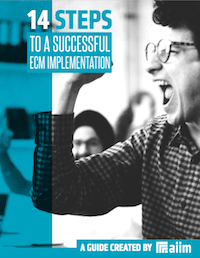The AIIM Blog
Keep your finger on the pulse of Intelligent Information Management with industry news, trends, and best practices.
Looking back from 2025, it's clear that IM technology implementations have consistently failed to deliver on their promises, not due to technical shortcomings, but because of a critical oversight: the human element. While organizations invest heavily in sophisticated platforms and systems, they consistently underestimate the psychological and cultural barriers that determine whether staff will actually use these tools effectively. This shortage of focus on employee psychology and workplace culture has been the key ingredient missing from successful information management transformations, with most efforts limited to basic training on new technology rather than addressing the fundamental behavioral changes required for sustainable recordkeeping practices.
Share
Information Governance | Intelligent Information Management (IIM)
The Communication Challenge for IM Professionals If you're out at a social gathering and there are people you don't know its inevitable that you'll be asked 'so, what do you do for work?' and in response you have to go into details to explain what IM which usually results in a puzzled expression. Why is it that colleagues in other corporate functions such as Accounting, Communications or Human Resources are readily understood and not ours?
Share

Making an ECM implementation successful requires planning and attention to detail. The best way to create the right solution is to identify organizational goals and priorities. Learn how to manage a successful implementation in our free guide.
Information Governance | Intelligent Information Management (IIM)
The Problem of Poor Naming Conventions In our last post, we argued that traditional records management models are failing in digital environments because they assume staff will deliberately create and capture records into formal systems, when in reality most valuable records are either never created, poorly documented, or bypassed into informal systems due to time pressures and system complexity. Compounding this issue is the poor application of naming conventions and metadata standards. Even when staff do attempt to capture records, inadequate or inconsistent naming makes information retrieval difficult. Without structured metadata or contextual tagging, records become effectively invisible within repositories, undermining their long-term accessibility and usability.
Share
Information Governance | Intelligent Information Management (IIM)
Creation And Capture Of Records Needs A Rethink The Evolution of Records Management Theory Since the 1980s, the creation and capture of records has undergone significant conceptual evolution, yet professional practice has not consistently kept pace with theoretical development. Foundational models such as the records lifecycle and the records continuum have offered foundational frameworks for understanding the management of information from creation to eventual disposal or preservation.
Share
Information Governance | Intelligent Information Management (IIM)
Has Information Management improved over the last 40 years? Are the various decision makers in organisations making better decisions based on complete record sets in 2025 compared to 1985? These are the questions we've pondered over as a profession with traditional Information Management (IM) thinking and disciplines being diluted through deprofessionalisation of the industry, reduction in further educational qualifications and theoretical knowledge.
Share